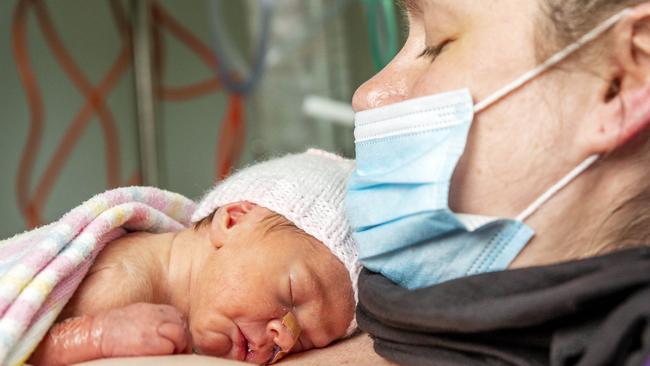Umbilical cord could save babies in need of CPR from brain damage
An incredible new study could change the way the medical world operates, with researchers making a breakthrough discovery on the best way to give a baby CPR after birth.

Victoria
Don't miss out on the headlines from Victoria. Followed categories will be added to My News.
Babies who need CPR at birth could be saved from brain damage if they're treated while their umbilical cord is still attached, new research suggests.
An incredible new study has found babies born with birth asphyxia may respond better, and be at lesser risk of permanent brain damage, if cord clamping is delayed until after the critical treatment has been performed.
This would mean the baby is given time to stabilise.
The preclinical findings — a world-first from researchers at the Hudson Institute of Medical Research in Melbourne — could see babies left attached to their mums for up to ten minutes post-treatment.
Associate Professor Graeme Polglase, who led the study, said the research could change the way the medical world operates.
“The reason we do research is to make a difference and this has the potential to make a difference worldwide,” Prof Polglase.

The current protocol is for babies needing critical treatment, such as CPR, to have their cord cut immediately.
They are then whisked off and treated away from the mother.
Prof Polglase said there’s now considerable evidence to suggest infants could benefit from receiving the lifesaving care before their cord is cut.
“This study is really focusing on the sickest babies that ever get born in our hospitals,” Prof Polglase said.
“What this study has done is investigate if it’s possible to do CPR while the baby is still attached to the umbilical cord and if it was beneficial.
“What was staggering is that yes you can … and it actually protects the brain from injury after they recover.”
In Australia about one in five babies are born in some sort of breathing distress — but many who survive are left with permanent brain injuries, including cerebral palsy.
Prof Polglase said he hoped the new research could help improve overall outcomes — especially for infants in developing countries where there are even higher rates of birth asphyxia.

“The main benefit we’re potentially showing is the protection of the brain,” he said.
“We could reduce the morbidity and improve the outcomes of these babies … and to reduce neonatal death rates, the potential impact of this is huge.
“I’m extremely excited.”
Tiny Rose Storey was born two weeks ago, at just 31 weeks gestation, weighing just over 1kg.
She was transferred to Monash Children’s Hospital’s neonatal intensive care unit and put straight onto oxygen to help her little lungs breathe.
Parents Meggy and Mark said they were so grateful to the hospital, staff and researchers who continue to look out for premature and sick babies.
“The care was amazing and whatever Rose needed they did,” Ms Storey said.
She said the couple had chosen to delay clamping the umbilical cord of their eldest so because of the known benefits.
“The baby comes first and if it helps in any way, why not,” she said.
The research, which was published in the Frontiers in Physiology journal, builds on previous clinical studies by the Institute in newborns with less-severe breathing difficulties.
Prof Polglase’s team has just secured funding from the Cerebral Palsy Research Foundation and will soon begin trialling the research in severely oxygen-deprived babies in Kilifi, Kenya.
MORE NEWS: WORLD-FIRST PACEMAKER COMBO HELPS YOUNG FRANKSTON WOMAN THRIVE

